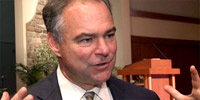BOB ABERNETHY, anchor: More about the increasingly controversial death penalty and about the limits of religious freedom with longtime legal affairs correspondent Tim O’Brien. Tim, welcome. Let’s start with the Supreme Court’s decision this week. Can you summarize it?
TIM O'BRIEN, correspondent: Well, the Court noted we have a long history of beginning legislative sessions with some prayer, but this case was different. The prayer was almost uniformly Christian, given by a Christian, usually a priest. And the Supreme Court said that still is OK, it doesn’t violate the First Amendment ban on establishing religion, so long as the prayer is not demeaning one faith over another or proselytizing.
ABERNETHY: But a lot of people in other religious traditions and secularists are very worried about that decision.
O'BRIEN: That is understandable. This invocation had all the trappings of a Catholic mass, although it was only a few minutes long. There doesn’t seem to be any limiting factor, other than the ones we mentioned – proselytizing, you can’t have that, and you can’t demean another faith. So we don’t know where the end is, but the message is a green light to city councils and town boards and state legislatures that if you want to do this, you can.
ABERNETHY: OK, and the death penalty. That botched execution in Oklahoma revived all of the old arguments about the death penalty – for it, against it. Where are we now in that?
O'BRIEN: Well, the country’s long been divided over whether to have it and has decided that we will have it in 33 states. But that only led to even more difficult questions. How do you do it? How do you implement it? And can you do it fairly and rationally?
ABERNETHY: And you and your colleague studied this in your book, Murder at the Supreme Court. What did you find?
O'BRIEN: Well, we chronicled the major death penalty cases to reach the Supreme Court. We found a uniformity there, too – that all the crimes and the criminals were truly horrendous, and they cried out for very severe punishment. And it helped us better understand why people feel strongly in favor of capital punishment.
ABERNETHY: And the argument for getting rid of it?
O'BRIEN: Well, we also discovered that too, the difficulties. It’s very, very challenging. One, [we’re] always concerned about executing someone who didn’t commit the crime. The evolution of DNA [testing] now shows that concern is even greater, that risk is greater than we thought it was. Race figures into it. If the victim is white, the defendant is much more likely to get a death sentence than if the victim is of a minority. It’s very difficult to provide adequate legal counsel. And there’s no way of predicting who is going to get a death sentence and who won’t. And there are roughly 15,000 murders in the United States every year and only about 80 death sentences. It’s just quite, it seems to be irrational.
ABERNETHY: And what’s your sense of the way the tide is running on that?
O'BRIEN: Well, one by one states are abandoning it. No state is adopting it. But the real significant change is that those states that have the death penalty are not implementing it. So it’s becoming less and less common. Last year, only 39 death sentences with 3,000 people on death row. We appear to be approaching the point where the Supreme Court could say it is so unusual and so cruel as to violate the Eighth Amendment. It’s not going to happen tomorrow, it might not be in our lifetime, but it seems to be the direction that we’re moving.
ABERNETHY: Tim O’Brien, many thanks.
O'BRIEN: My pleasure. Thank you, Bob.









